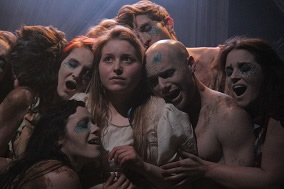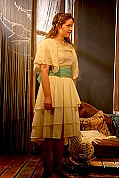Mary Rose Suffers from a Surfeit of Spooks
The extra ghosts in J M Barrie's classic play just don't work, says Penny Flood
Mary Rose by J M Barrie is a lovely play and it’s good to see it revived. Written in 1920 and set in late Victoriana, it combines the twin Barrie themes of eternal youth and the agony of a mother who has lost a child (as in Peter Pan). It is a ghost story that keeps you guessing until the end.
But sadly we were kept guessing even after the end on the night I was there because of a serious hiccup in the Riverside technology. Half the dialogue of the final scene is pre-recorded and it was unintelligible when it was played back it. A scene that was meant to be touching and poignant was therefore rendered meaningless. Was this not tested during rehearsals?
Unhappily, this wasn’t the only technology failure: the dry ice machine clicked loudly all the way through.
The play opens with young Harry (Charlie Kersin) newly arrived from Australia. He is being shown around a house by a nervous housekeeper (Joanna Watt) who thinks he wants to buy the place, but he’s obviously been there before and it soon becomes clear that there’s a lot more to it than that.
While she goes to make him a cup of tea, the ghostly story is enacted around him. It is about young Mary Rose (Jessie Cave), whose parents are keeping a dark secret about something that happened in her past.
They’ve never told her but they feel obliged to warn the man she marries, Simon (Carsten Hayes) who is sworn to secrecy.
There’s much more to the play than just this mystery. Barrie can spin a good yarn and the play is given depth and the plot moved along with scenes of family life. The background mystery and sorrow is tempered with some witty dialogue about class snobbery and the pretentiousness of art appreciation.
This takes place between Mary Rose’s parents (Nicholas Hoad and Maggie Robson), their good friend Mr Amy (Alec Grey) and the Scotsman Cameron (Phil Bishop), who knows more than he’s letting on.
Director Matthew Parker has chosen to stage this with the addition of an ensemble of ghosts, which just doesn’t work. Although they look lovely and their spectral singing is beautiful, they crowd the little Riverside stage, especially at the end of the first half which is ruined by a clumsily choreographed and awkwardly performed dance routine.

Except perhaps when they act as scene shifters, fiddling with the complicated scenery, as the action moves from the clutter of a Victorian home to an equally cluttered Hebridean island, these additions are pointless and distract from rather than enhance Barrie’s original.
There’s nothing wrong with putting a new slant on an old work, but simply slapping on another layer isn’t the way to do it. Changes can be made to the original, but they need to be seamless and bring fresh insight.
This is especially true with a piece as well written and well balanced as this one (it was Barrie’s most successful play) and a strong cast was let down by some ill-thought through directorial ambitions.
Mary Rose is at the Riverside Studios until April 28.
Riverside Studios
Box office 020 8237 1111
April 5, 2012
Related links
|
